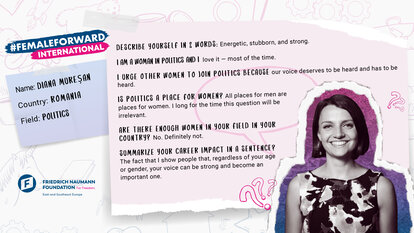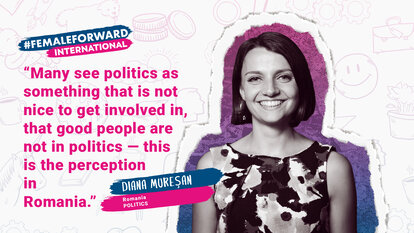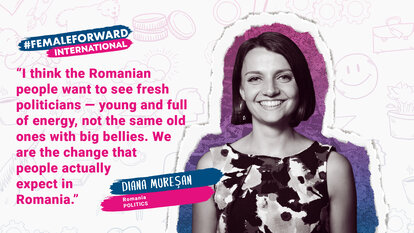#FemaleFowardInternational
The importance of starting from the bottom

Diana Muresan on the joys and hardships of joining a brand-new party and the conscious choice of not skipping steps when climbing the political ladder
In 2016, Diana Muresan, a young woman who lives in Sibiu, Central Romania, watched as the “Save Bucharest” movement swept a third of the mayoral vote in the country’s capital. While their candidate Nicușor Dan failed (for a second time) to take the mayor’s seat in Bucharest, the example he and his colleagues made served its purpose. The relentless decade-long work fighting for the preservation of the city’s cultural heritage and against corruption inspired Muresan, along with thousands of other Romanians who yearned to be politically active but did not want to get their hands dirty with the existing parties.
“I came to the conclusion that, if I only kept on hoping that someone else will take care of it, it was not going to help. So I followed the wise old words "be the change you want to see in the world," step out and do something yourself, and be part of the change,” Muresan says about that turning point of her life.
Four years down the road, USR, under the leadership of Dan Barna, a specialist in EU-funds and a former member of the technocratic government of 2016, has forged an alliance with their current partner PLUS and have become one of the most influential political forces in the country. The coalition holds a strong delegation of eight MEPs, a bunch of mayors in major Romanian cities including the capital, and almost a fifth of the members of the Romanian Parliament. Diana Muresan, on the other hand, heads the local branch of the party in Sibiu and is a representative on the city’s municipal council, where the party now holds four out of 23 seats. While now she says she has found her passion in public affairs, four years ago this could not have been farther from the truth.

First steps and first hurdles
A young graduate of pharmacology who had just started her own small tourism business with her soon to-be-husband Catalin, the last thing she was thinking at the time was that she would become a politician. “None of the other parties appealed to me because they practiced nepotism. For them, having the right relations with the right people is more important than being competent. I never imagined I would enter politics or that I would have a career as politician but I entered because Romania needed a change,” she says.
A few months after the 2016 local elections, the “Save Romania Union” (USR) was born, on the wave of popularity and support Nicusor Dan had gained. Catalin joined the newly formed Sibiu branch of the party and, after a brief hesitation, Diana followed suit. This move was not exactly welcomed by their closest ones. “In the beginning my family didn't really understand our involvement. Because politics in Romania is not considered something you want to do, good people don’t get involved in politics – this is the perception here. Our parents and relatives always told us – ok, you are successful people, you have your own business, you've travelled a lot around the world – why do you want to do that?” Muresan remembers.

This was not the only problem – for her parents it was even more perplexing that she, as a woman, is getting even more involved in the local branch of USR than Catalin. This sort of attitude is still a commonplace in many parts of Romania. “I think in Romania being a woman is subject to many clichés,” she says. “It is expected of you to neglect your career and your dreams in order to maintain a household and raise children. It is expected for the husband to have a political career, to bring in the money to the household,” she adds. Despite her active involvement with the party, very often Muresan faces casual neglect by prospective voters. “The difference is mostly in rural areas, where women leaders are not taken seriously. When we do campaigns and go around villages to talk to people, if there are five men and two women, people tend to speak to the men rather than to the women. So you have to go up front and talk yourself,” she laughs.
This did not dissuade the young politician from becoming more active – on the contrary, it motivated her to become more confident and assertive in public. With the support of her now-husband Catalin, who saw that the flame for public affairs burned even stronger in her than in him, she made progress both within USR and in the electoral campaigns the party has been carrying out locally.

A politician who does not want to pretend
Unlike many other politicians who might be flushed with such relatively quick success, Muresan prefers to take it slow. “I decided to do it step by step. “I could have run internally to be a candidate for the EU elections or Parliament in 2016, but I wanted to start from the bottom and learn everything that I can on this step, and then take another one,” she shares. Her passion for Sibiu – a city of historic landmarks that has long been a pride of Romania – made her decide that she wants to focus on making life better for her immediate community, just as her colleagues from the beginnings of the movement did in Bucharest. “Our party is a grassroots party and everything starts from the bottom then goes to the top. And in the same way, I want to build my career in politics, from bottom to top,” Muresan states with conviction.
For her, the "fake it till you make it" approach that many politicians take would not work – she wants to understand the nuts and bolts of local administration so that one day, when she enters Parliament (yes, she does not shy away from her long-term ambitions) she knows better how to do good for her constituency. “People see the position of parliament as somewhat higher, but if you want, you can do nothing – just go to meetings, vote, and do nothing for four years. Finding solutions to problems in your community is harder,” Muresan concludes.
For now, her main objective is to see Sibiu reach its potential and not just rest on its laurels. “Sibiu was for a long time a model city for the rest of Romania – we were a European capital of culture and it is cleaner than other cities. We can do a lot better as a city, we can be on the same level as cities in Western Europe,” she says, singling out the areas of digitalization and connection to nature as areas where she wants to see an improvement.

Lessons from a troubled past
Her focus on local affairs does not mean that Diana Muresan is not concerned with the wider context she and her party operate in. “I identify myself with the liberal values and freedom is actually one of the values I cherish the most,” she says. “Knowing the past of my country and knowing that my parents lived in an authoritarian regime with very few liberties made me appreciate freedom even more,” she adds.
For Muresan, what drew her to the USR was precisely the fact that the party is actively fighting for the values she believes in. “I chose USR because it fights against corruption, it's the first party that wants democratization, the rule of law, the elimination of sinecures in all levels of the administration, and also for efficient spending of public money, so we have state hospitals, good infrastructure, and a better educational system. We can achieve all of this if there is no corruption.”
She sees many of the problems Romania faces nowadays – including sexism – were planted by the totalitarian regime of Nicolae Ceausescu. “Socialism as an ideology wanted to make men and women equal, but that was not the fact in Romania. If we speak about birth control, after a decree in 1966 Romanians were supposed to give birth to many children, it was difficult to do something else outside of the family as a woman,” she says.

While these detrimental policies are in the past and women in the country are free to make their own decisions in life, the 40 years of dictatorship left a long-lasting mark on the public perception of women in the country. “We didn't really have many women leaders during socialism, apart from Elena Ceausescu – the wife of the dictator, and Ana Pauker1, but these were the only two figures during a 40-year period. Women were also a part of the party, but they didn't hold high positions, they were nowhere near the front.”
The lack of role models from the past translates into lack of assertiveness nowadays. “It is a question of mentality, and sometimes I see it in myself. It is the kind of bringing up we got in our families. We are not that confident like men because we weren't brought up the same way as men,” she says, recalling a funny – but telling - example from her own family. “When I drive back home to see my parents and grandmother, she asks me who will drive the car: “I hope Catalin will drive the car.” I tell her that I drive just as well as he does and I have had a driving license for as long, but she has more trust in men, because she has been brought up to think that men are better drivers.”
1 The first female Foreign Minister in Romania – and the world – in the 1940s.

Receiving support and changing attitudes
Luckily, she has been able to overcome these attitudes through the positive attitude of her husband and other male colleagues in her party. “A lot of people think that only women can be feminists, but there are many men who are feminist fighting for the rights of women and I hope that in the future, we will have the support of our male colleagues. I get a lot of support from my male colleagues in our branch, sometimes more than from the female colleagues”, Muresan says. “This is nice to see, as it comes from the new generation that is not that touched by the preconceptions of the older people, that reads a lot about this subject, and who travel a lot to other countries and see the way of life there,” she concludes.
Yet, Muresan’s own experience growing up in a conservative society taught her that change does not always come easy – or is necessarily welcomed. “We live in a time of change now, in all countries, and people are not always reacting in a good way when change comes their way. And when change comes, they tend to look to the past – in the past everything was perfect, beautiful,” she says. “I see it in Romania – when some people think of the Communist era, they don't think about the limited liberties but only about the good parts. Maybe it is a reaction by our brain to comfort ourselves. But I think it can't be stopped – it is like a snowball – yes, there will be some obstacles but you can't stop the change now,” adds the politician.

She is convinced that the only thing progressive political forces need to do is to keep on pushing, giving an example of the conservative movements against gay rights in Romania and to abortion in Poland. “I am an optimist and I think we are going in a good direction – we had the same problem [as in Poland] with the referendum on the traditional family1 . We were the only party that was against this change to the constitution and everyone told us that this is not politically feasible, that we will clash with the Church, which is very powerful in Romania. They told us that it is not good for us, that it will be our end,” Muresan says. After the referendum was, in practice, boycotted by the majority of Romanians, it turned out that, on the contrary – USR was the only party that gained support from its principled stance. “You have to have the courage to say what you think and we will move in the direction of a more open society,” Muresan says.
“I think that, in Romania, people want to see fresh politicians – young and with energy, not the same old ones with big bellies. We are the change that people actually expect in Romania. And I think that people in Romania are ready for more women in politics, and more young people. It is our time now,” she concludes.
1A 2018 referendum in Romania asked voters if they want restrict the constitutional definition of family to only a union of a man and a woman.
Follow more stories on female empowerment with #FemaleForwardInternational and in our Special Focus on the website.

